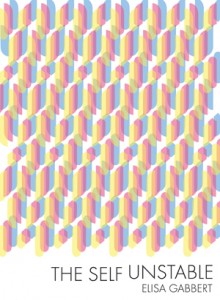 The Self Unstable
The Self Unstable
by Elisa Gabbert
Black Ocean, Nov 2013
96 pages / $14.95 Buy from Amazon or Black Ocean
Already, I have the problem of memory. Memories act precariously when they are the palate of thought. Example: I can’t remember when I first read Elisa Gabbert, but I remember the rough poetics of The French Exit. Bodies and minds took beatings. The words violenced through the poems. I was especially captivated by the sexual aggression. A voice attempted to transcend the self through bodily destruction, like autoerotic asphyxiation. Like a lack of could force the mind out of the body.
The Self Unstable exemplifies a bodiless self. Gabbert explores how thought dictates action, then action dictates belief. Memories lead the way because they create an illusion of understanding. “It can almost ruin you, the belief that you can choose,” (3). Language shreds the roles of identity. Her Twitter-brain essays/poems fragment connections. Art, games, leisure, love, sex – everything that fills our time – seem like activities to enjoy. Instead, they [dis]assemble the violent act of creation.
Animals, news, dreams pollute the mind. Where is placement? Ego feels displaced. Ego never had a place. Like grandparents coming through Ellis Island, body and mind attempt to locate a self. Look, my Dad found the papers. The family’s entrance was legitimate. At least on my Mom’s side. Names were misspelled, but sound has barely changed. The art of phonetics assert an idea of WHO. Some sort of declaration of I AM.
Generations exist as fragments collaged through shared behaviors. Family is why I’m here, but is family ME? Who has a choice in creation? Forget ideals, love and sex are “enjoyment of adversity,” (67). We ruin others. Relationships start based on these fallacies. Gabbert explains that a shared a taste in music creates the idea sameness. My mixtape to you means SOMETHING.
If we are not friends, I’m probably looking for sex. Sex drives interaction. When the self is unstable, adoration is not the goal. “I like men to dislike me a little,” (74). The act is an ultimate sharing of fluids, but we pretend it stands for intimacy. As if we can take our self to the lab. As if we swallow someone else’s fluids/words/scent, then understand it ALL. Pretend history is total.
Like a tomboy getting changed in a female locker room, the self feels uncomfortable among others. I never knew the right thing to say. Now everyone is “in love with” things/people/ideas, but when I used the term of endearment “love” because I heard it on television, other girls would move a few lockers away. The game of self is affirmed by others. Admire a shirt, a haircut, a limb, but never a total being. I never associated those interactions with sex, but I was longing for acceptance.
I hear something in music. My mind and body can’t explain it. The euphony and cacophony blend into different heart rates. The ticking self counts down days. “Human life is structured around overcoming problems, primarily hunger,” (14). I have needs, but they are not defined. Most actions are reactions to wanting more feeling. Addressing hunger imples a need to live long. Laugh and cry at the same time.
What else is left? When you are bored, it is selfish to make another human. Creating another person documents the memory of your DNA. Stop hording. Environmental factors alter genes, but the constant chaos of genetics is more stable than the self. You disappear, but your imprint does not.
What do art and aesthetics do? They do not clothe or feed, but they unsettle when moving past an attempt to describe beauty. Beauty is remembered and old, a product of easy memory. “In the pursuit of the new, we must cultivate fear, where there was no need for it historically,” (39). I understand take-off, but I do not understand landings. At such speed, shouldn’t everything smash? I want to collide colors with language to the point of vomiting.
Stay awake through life. Standards exist before us. What to do with them? Dress in themes. Colors are defining even if someone else chooses them.
***
Tracy Dimond co-curates Ink Press Productions. She is the author of Grind My Bones Into Glitter, Then Swim Through The Shimmer (NAP 2014) and Sorry I Wrote So Many Sad Poems Today (Ink Press 2013). Her work has recently appeared or is forthcoming in Big Lucks, the Fanzine, Be About It, Coconut, Everyday Genius, Hobart, and other places.
Tags: elisa gabbert, The Self Unstable, Tracy Dimond

It’s great to see this here. This book’s at the top of my summer “outside of school” reading list.
This review doesn’t make sense, but the book was incredibly good.
Postmodernism doesn’t make sense, but it’s pretty important to the literary world (as is this article, rawbbie). Look at those two introductory sentences: that is the end to a thought you have never had, but always knew should have made a pass in the empty ring that is yr brain. That is the ending couplet to the twelve lines I thought about the ephemerality of knowledge being like the meal I have already eaten; it is only a memory on my palate. So concise, so metaphorical, which goes against being sensical in flipping nature, rawbbie.
If “hording” is a mistyping of ‘whording’, that’s an especially good pun in that place.